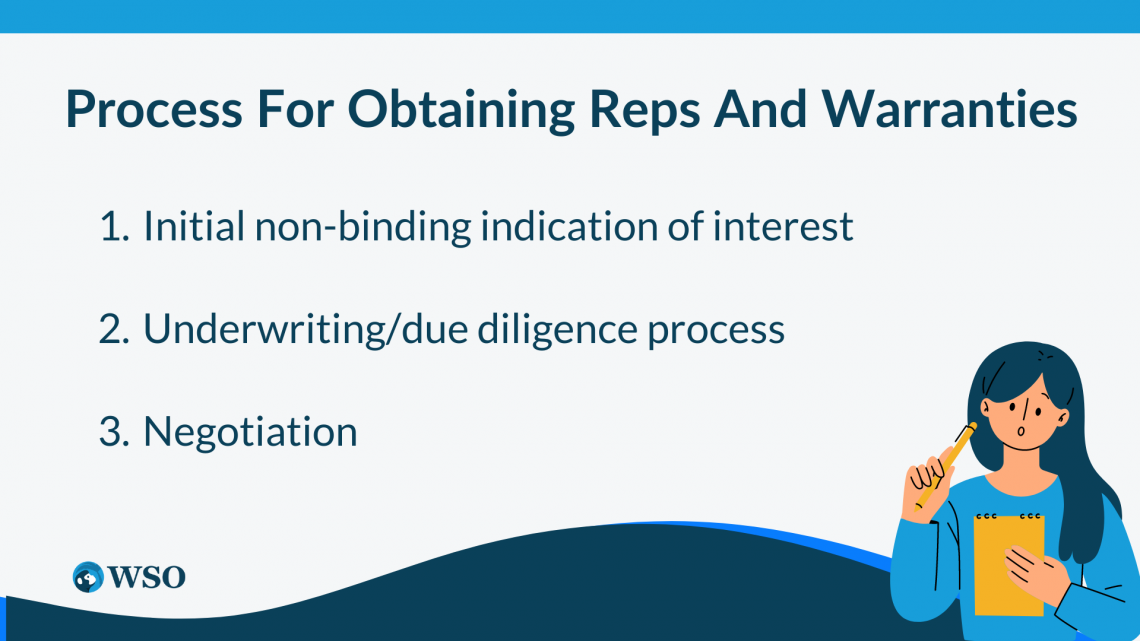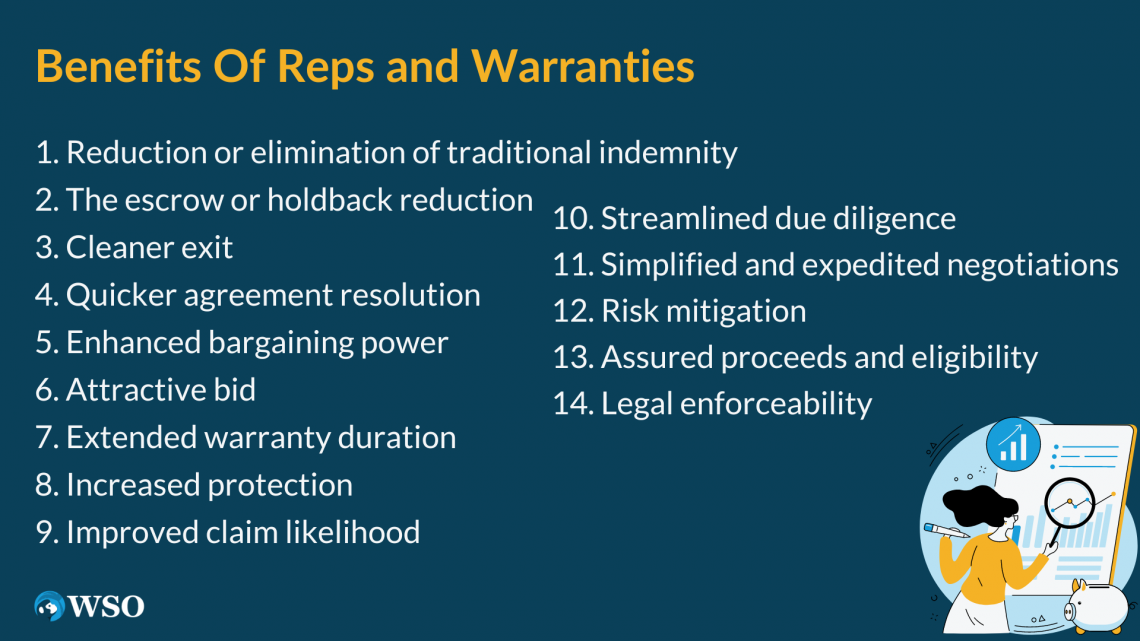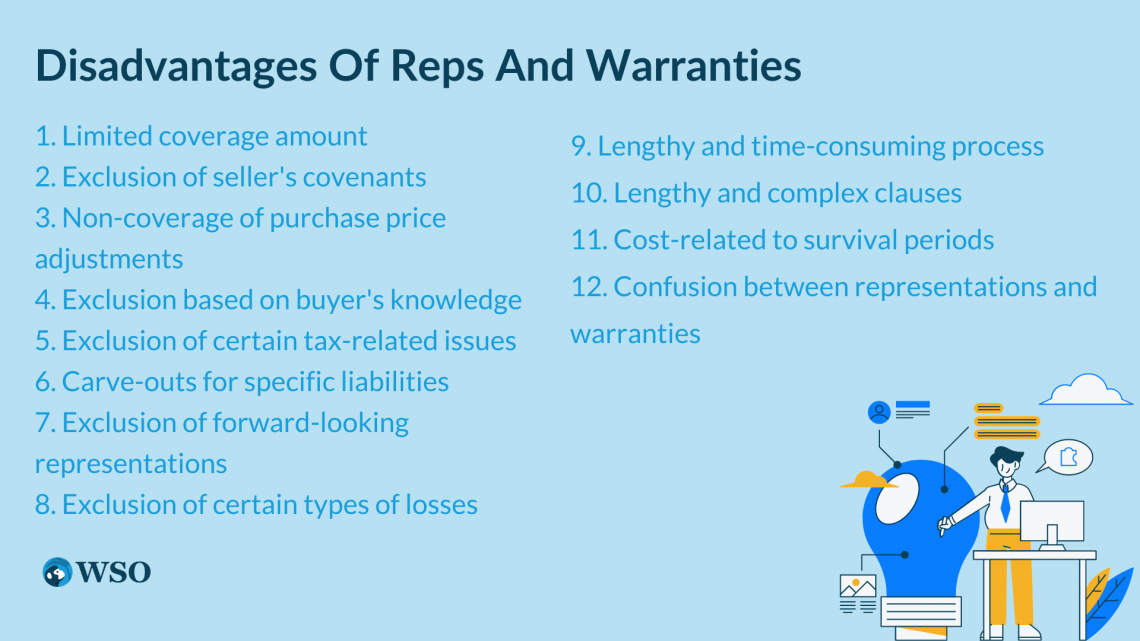Reps and Warranties
These are fundamental clauses included in a purchase agreement when selling a mid-size business.
What are Reps and Warranties?
Reps and warranties, short for representations and warranties, are fundamental clauses included in a purchase agreement when selling a mid-size business.

These clauses consist of statements regarding the company's affairs, assets, liabilities, and activities, which include past, current, or future events. These clauses ensure transparency and minimize risks for both parties involved.
Representations, often referred to as representations of fact, are statements made about the company's current state.
If a representation is untrue, it is considered inaccurate. For instance, a seller can claim that the business property is in good shape or that the company has complied with all applicable legislation.
In contrast, warranties are promises made by the seller to the buyer. If a warranty is untrue, it is considered breached. For instance, a seller may warrant that they will regularly operate the business and comply with laws until the deal's closing.

Understanding reps and warranties is crucial before signing a purchase agreement as a seller. Some key considerations include the most common issues addressed by reps and warranties, their purpose in the buying and selling process, and the implications of breaching or inaccurately representing these clauses.
Additionally, buyers may use reps and warranties to allocate risk, disclose material facts, and establish baskets and caps to limit potential liabilities. Providing accurate information and supporting documents is essential in reps and warranties.
Sellers must provide sufficient evidence to support their asking price, such as financial statements, contract listings, and proof of asset ownership. Conversely, buyers may need to represent the legality and condition of the consideration offered for the transaction.

Reps and warranties play a critical role in the buying and selling businesses, ensuring transparency, mitigating risks, and providing a basis for potential indemnification.
In recent years, there has been an emerging trend of using representations and warranties insurance in mergers and acquisitions to protect against breaches of representations by the seller. This insurance can offer additional benefits to the buyer and seller involved in the acquisition.
In short, reps and warranties form an integral part of purchase agreements, safeguarding the interests of both buyers and sellers.
These clauses establish the factual basis of the transaction and help allocate risks appropriately. Understanding the details and implications of reps and warranties is crucial for a successful business sale.
Key Takeaways
- Reps and warranties serve as contractual statements made by the buyer or seller in an M&A transaction, providing assurances about the target company's condition, operations, and legal compliance.
- Reps and warranties are vital in the due diligence process as they enable the buyer to evaluate the precision and comprehensiveness of information disclosed by the seller, enabling them to identify and evaluate potential risks and liabilities.
- Breaches or inaccuracies in reps and warranties can lead to disputes and financial consequences. The resolution process and available remedies, such as holdbacks or litigation, depend on the terms outlined in the purchase agreement.
- Reps and warranties can be subject to baskets and caps, which set thresholds and limits on indemnification obligations, impacting the initiation of disputes and calculation of damages.
- A thorough review by experienced M&A attorneys is essential to ensure that reps and warranties adequately protect the buyer's interests, address potential risks, and comply with legal requirements.
Process For Obtaining Reps And Warranties
Obtaining representations and warranties insurance typically involves several steps, starting with the buyer or seller engaging an insurance broker to gather quotes from insurers.

The process typically involves 3 stages:
1. Initial non-binding indication of interest
The insurer provides a preliminary assessment of the insurance coverage and costs. It is typically free of charge and helps the buyer or seller gauge the insurance's feasibility.
2. Underwriting/due diligence process
If the initial indication of interest is favorable, the next stage involves a more in-depth evaluation by the insurer, requiring payment of an upfront underwriting or due diligence fee. The fee usually ranges from $15,000 to $50,000.
Key information and documents that insurers will typically review include:
- Parties involved: The identities of the buyer and seller.
- Coverage amount: The desired insurance coverage limit.
- Acquisition agreement: The form of the agreement, with a specific focus on the seller's representations and warranties, which determine the scope of coverage.
- Online data room: The insurer may request access to the seller's online data room, which contains relevant documents and information about the target company.
- Due diligence report: The buyer's due diligence reports on the seller provide insights into the target company's operations, financials, and potential risks.
- Disclosure Schedule: The seller's Disclosure Schedule is connected to the acquisition agreement, which outlines any exceptions or qualifications to the representations and warranties made.
3. Negotiation
After completing the underwriting and due diligence, the insurer and the insured (buyer or seller) negotiate to finalize the policy's specific terms.
This includes determining the scope of losses covered by the policy and those excluded from coverage.
Note
The policy terms are customized based on the transaction's unique circumstances and risk profile.
The process for obtaining representations and warranties insurance involves engaging an insurance broker, providing necessary information and documents, receiving preliminary quotes, undergoing underwriting and due diligence, and negotiating the policy terms.
Benefits Of Reps and Warranties
Representations and warranties insurance provides multiple benefits to both sellers and buyers in a deal. Including a representations and warranties clause in the purchase agreement is important to ensure a transparent and mutually beneficial transaction.

Let's systematically examine the advantages, covering all points and adding more if possible:
- Reduction or elimination of traditional indemnity: Sellers can minimize or eliminate their post-closing liabilities by relying on the insurance policy to cover breaches of representations and warranties.
- The escrow or holdback reduction: Sellers can avoid the need for a substantial escrow or holdback amount, thereby maximizing the proceeds received at closing.
- Cleaner exit: Sellers can achieve a cleaner exit from the business sale by transferring contingent liabilities through the insurance policy, minimizing potential future obligations.
- Quicker agreement resolution: Sellers can provide more extensive representations and warranties without excessive qualifiers. Providing extensive representations and warranting can lead to a faster resolution of the acquisition agreement.
- Enhanced bargaining power: With insurance support, sellers can be more accommodating in meeting the buyer's requirements and demands, leading to smoother negotiations.
- Attractive bid: Buyers can make their bids more appealing to sellers by offering limited or no escrow or holdback requirements since the insurance provides comprehensive indemnification protection.
- Extended warranty duration: Buyers can secure an extended period for the duration of representations and warranties. Extending can provide additional time to identify any issues with the acquired business.
- Increased protection: The insurance policy offers more excellent protection to buyers, exceeding the coverage amount that sellers might agree to without the procedure.
- Improved claim likelihood: Buyers have a higher chance of prevailing on a claim under the policy since sellers are more likely to provide extensive representations and warranties in the acquisition agreement.
- Streamlined due diligence: With the seller's increased disclosure facilitated by the insurance, buyers can conduct their due diligence more efficiently and confidently.
- Simplified and expedited negotiations: The anticipated use of representations and warranties insurance simplifies and speeds up the negotiation process as sellers have less interest in negotiating the scope of their representations, especially if they do not survive closing.
- Risk mitigation: Including a representations and warranties clause helps mitigate the risk of financial loss. The risk is mitigated for both parties by ensuring full disclosure and providing a platform for mutual understanding.
- Assured proceeds and eligibility: Including reps and warranties allows both parties to qualify and fulfill their end of the agreement, assuring the deal's closing as planned.
- Legal enforceability: Reps and warranties serve as legally enforceable terms, recording all the conditions and facts in the agreement to ensure lawful implications.
By leveraging representations and warranties insurance, sellers and buyers can protect their interests, simplify negotiations, reduce financial risks, and facilitate a smoother and more efficient M&A transaction.
Disadvantages of Reps and Warranties
Despite the advantages, representations, and warranties, insurance comes with certain limitations and exclusions that buyers and sellers should be aware of.

Let's examine the disadvantages and challenges of acquiring such insurance systematically, including additional points:
- Limited coverage amount: Policies typically have a cap on the coverage amount, often around 10% of the total deal consideration. This means buyers may be exposed to extraordinary losses beyond the coverage limit.
- Exclusion of seller's covenants: The insurance policy does not cover breaches of the seller's covenants outlined in the acquisition agreement. Buyers may still need to rely on traditional post-closing indemnification for such breaches.
- Non-coverage of purchase price adjustments: Insurance does not cover purchase price adjustments, such as those related to working capital changes at the deal's closing date. These adjustments remain the responsibility of the parties.
- Exclusion based on buyer's knowledge: The policy may exclude losses from breaches of representations and warranties that the buyer knew of, usually defined as "actual knowledge" of certain identified deal team members. The exclusion may limit coverage for material risks discovered during due diligence.
- Exclusion of certain tax-related issues: The policy may exclude tax-related matters such as taxes accrued before the closing date, transfer taxes, disclosed taxes, and the availability of net operating losses and R&D tax credits.
- Carve-outs for specific liabilities: Liability associated with misclassification of employees/independent contractors, wage and hour laws, and asbestos or other environmental issues may be excluded from coverage.
- Exclusion of forward-looking representations: The policy may not cover forward-looking representations and warranties, including revenue projections or future performance expectations.
- Exclusion of certain types of losses: The policy may exclude specific types of losses, such as consequential or multiple damages, limiting the scope of coverage.
- Lengthy and time-consuming process: Acquiring representations and warranties insurance can be time-intensive. Both parties must agree on terms that satisfy their respective needs.
- Lengthy and complex clauses: The extensive and complex nature of warranty clauses may increase the chances of overlooking potential loopholes, requiring careful attention and review from both parties.
- Cost-related to survival periods: Negotiating the survival period can lead to varying costs, as buyers may prefer a longer period for scrutiny, while sellers aim to close the deal quickly. Poor negotiations may result in unnecessary expenses.
- Confusion between representations and warranties: The separate use of representations and warranties can lead to confusion due to their differing legal interpretations. Both parties should exercise caution and clarity in using these terms independently.
Note
Additional challenges may arise during the negotiation and recording of reps and warranties insurance, such as the wide range of facts to be recorded, potential misunderstandings in bargaining, and discrepancies in the desired time frames for future business projections.
While representations and warranties insurance offers benefits, buyers and sellers must weigh these disadvantages and challenges to determine if they align with their specific needs and preferences in a given M&A transaction.
Reps And Warranties FAQs

Reps and warranties insurance offers coverage for the representations and warranties made by target companies or sellers in a purchase agreement during an M&A transaction.
It safeguards against potential financial losses, including defense costs arising from breaches of reps and warranties. While the seller typically acquires this insurance, there are instances where the buyer may opt to purchase it as well.
The duration of reps and warranties can vary. The central representations and warranties typically remain valid for 3-5 years. On the other hand, intermediate warranties may be in effect for around 18-24 months, while non-fundamental warranties may have a similar duration.
Reps and warranties in M&A transactions often include provisions related to baskets and caps, which impact the triggering of disputes and the calculation of damages.
- Basket: A basket sets a minimum threshold that must be reached before a dispute can be initiated. It can be compared to an insurance deductible.
- Cap: A cap establishes the maximum limit on the seller's indemnification obligations towards the buyer. It defines the upper limit of the seller's liability for damages.
Suppose a representation or warranty is breached or found to be inaccurate in an M&A transaction. In that case, the dispute resolution process specified in the purchase agreement, such as arbitration or litigation, comes into play.
Remedies for the buyer include:
- A holdback is where a portion of the purchase price is held in escrow for a specified period, typically ranging from 10% to 20% for six to 24 months.
- A right of setoff against future payments
- Litigation may be pursued.
A careful review of financial statements by a CPA is crucial, especially regarding their condition and accuracy.
When reviewing reps and warranties, lawyers focus on key aspects to ensure fairness between the buyer and seller. They examine:
- The legality of the business
- Tax compliance
- Accuracy of financial statements
- Inventory Status
- Employees' benefits
- Environmental liabilities
- Document integrity.
This scrutiny ensures the business is legally sound, free from tax issues, and provides accurate information on finances, inventory, employee benefits, environmental obligations, and trading documents.




or Want to Sign up with your social account?